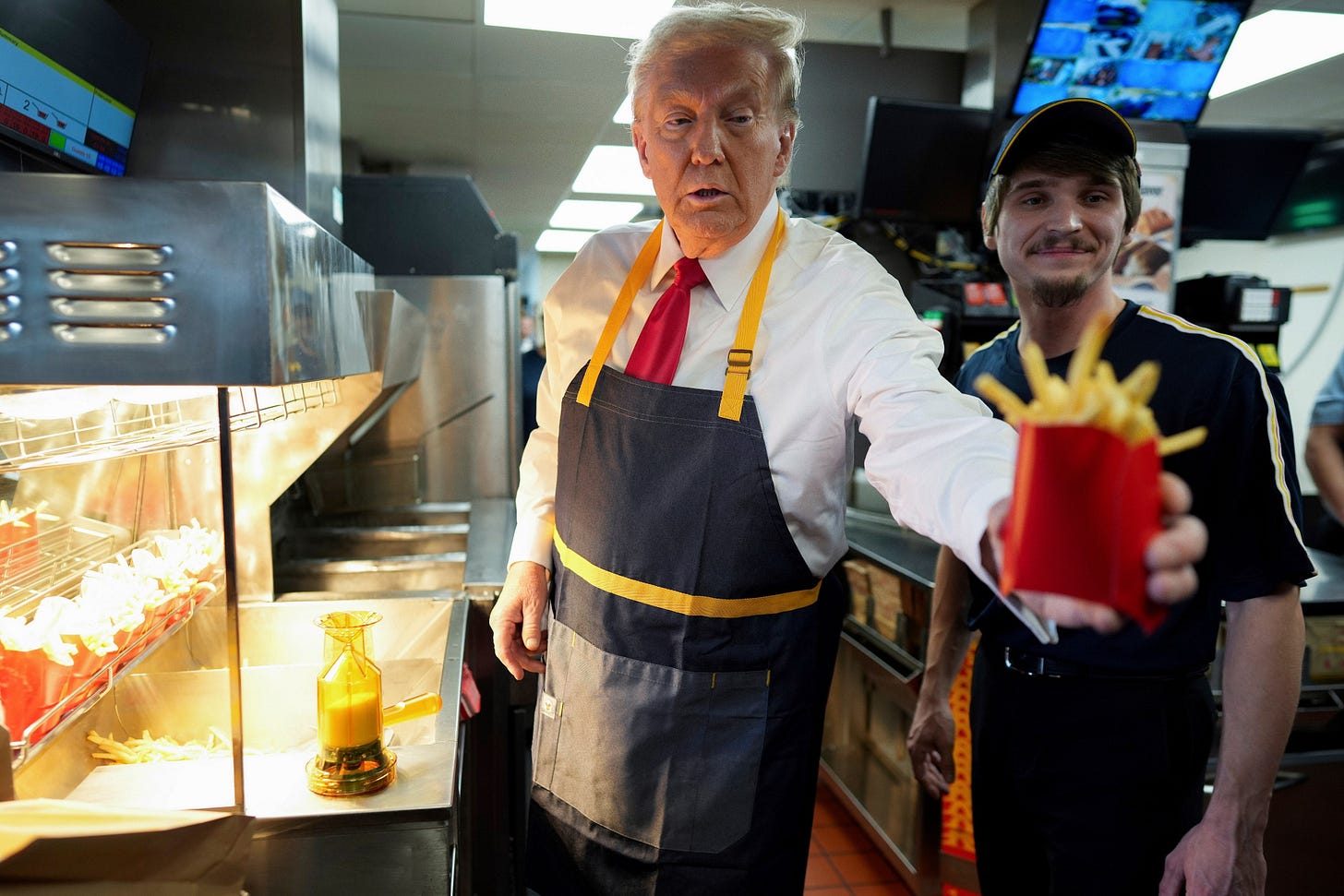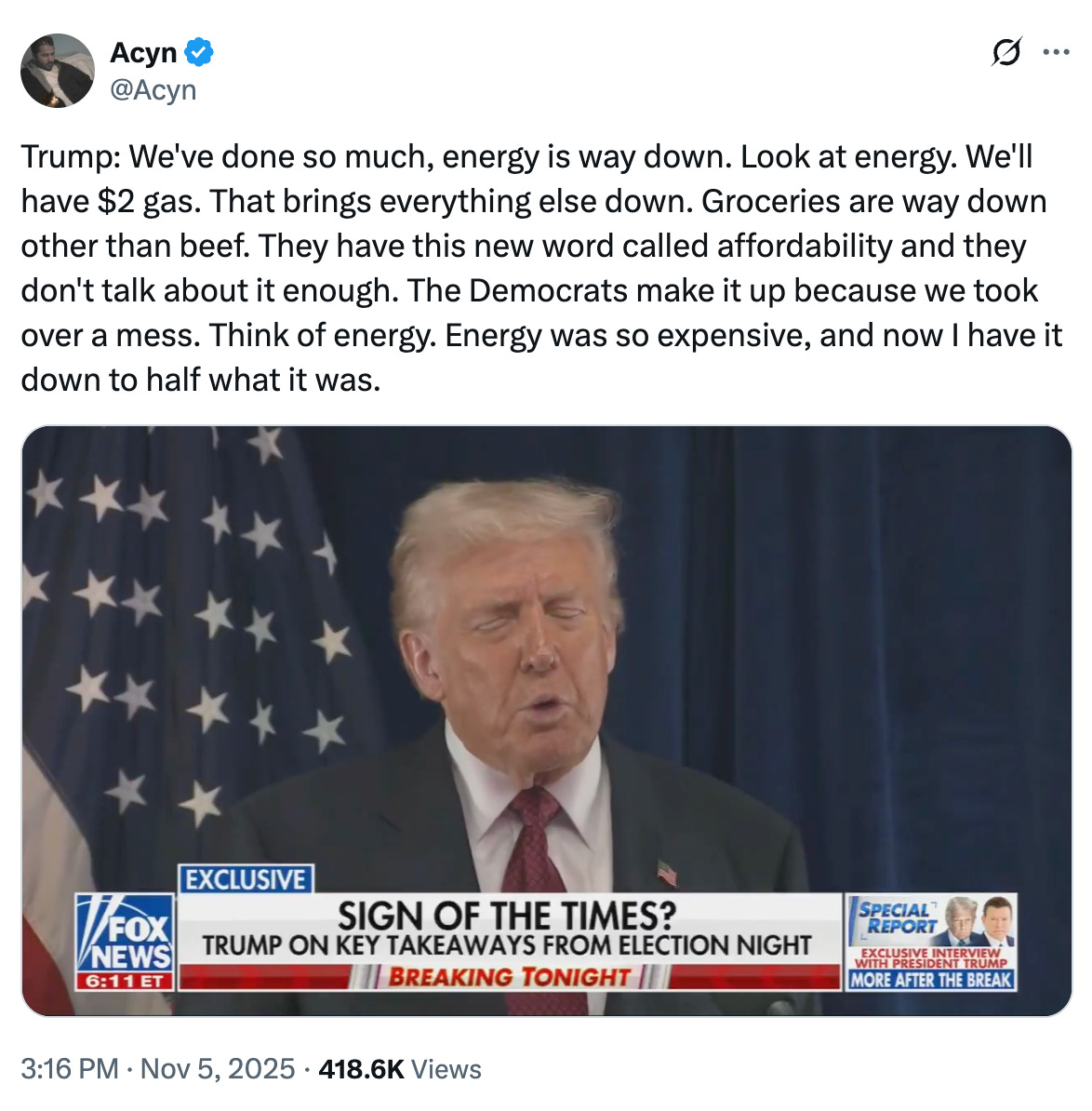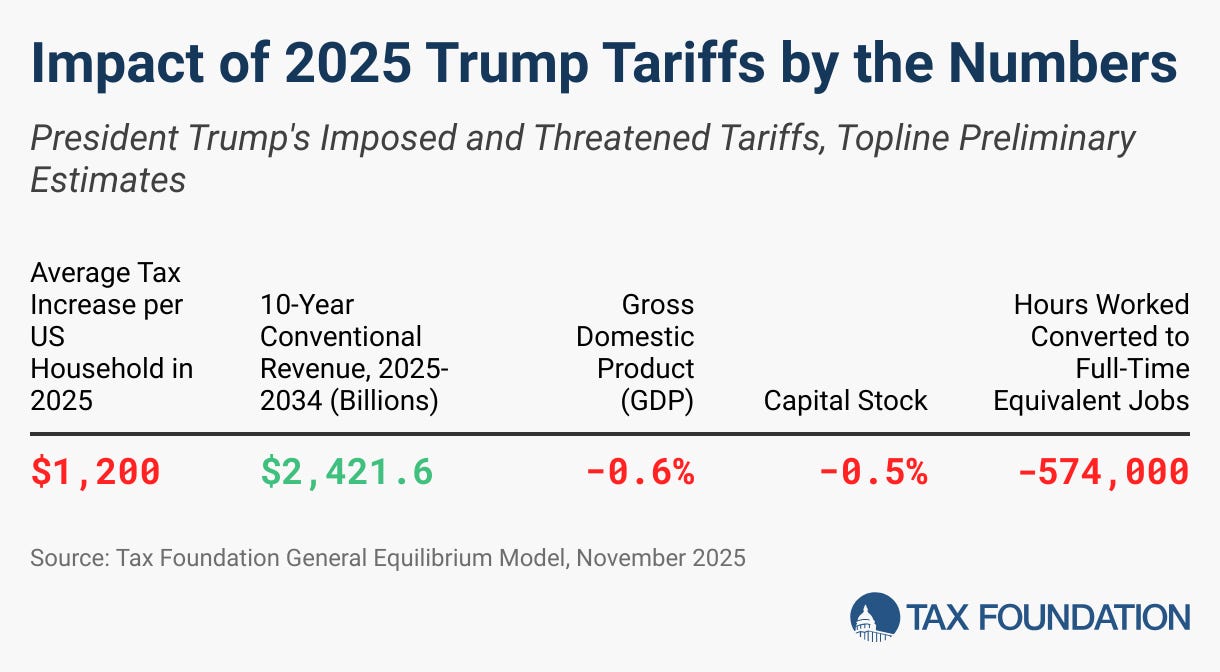Trump Discovers ‘Affordability’ and Hates It
As much as he would like to escape this word "affordability" it keeps coming back to haunt.

After suffering stinging defeats in the 2025 off-year elections, Donald Trump suddenly pivoted to talking about “affordability” – a term he claimed Republicans hadn’t used enough. In a Fox News interview following those losses, Trump remarked, “They have this new word called affordability, and [Republicans] don’t talk about it enough. The Democrats did…”
Image Credit: Acyn
Of course, the irony is palpable: cost of living had been a central issue in the 2024 campaign, yet only after voters rebelled did Trump start seizing on that buzzword. This strategy also seemed to be a bit similar to the approach that Biden had taken, while telling voters that inflation was “transitory” and the economy was doing great. To the point, Biden alums came out to say they tried this approach, and failed!
Image Credit: David Weigel
It appears that the GOP is about to repeat the fatal flaw that the Biden administration suffered from; not validating the economic concerns that voters feel from inflation. Of course, Trump has taken this a step farther. While I believe the Biden admin at least had good intentions, this is not even a subject the Trump admin can pretend to care about!
And Americans are noticing. Polling across 2025 shows that Trump’s support is eroding fastest among the some of the very groups most battered by affordability pressures, Trump’s approval rating has cratered to around –50 net for voters 18-29, according to a late-2025 YouGov/Economist poll, with 67 percent of Gen Z voters disapproving his performance.
When confronted by a supporter about high grocery prices, Trump’s response raised eyebrows. “I think of groceries. You know, it’s an old-fashioned word, but it’s a beautiful word,” he mused, as if “groceries” were a novel concept to him. This from a man who once admitted he’s “never even gone to a food market” in his life. Trump went on to insist that prices were “way down”, bragging that he’d lowered costs (a false claim, since food prices were actually 18% higher than in January 2022)
Image Credit: CBS
In fact, his new love of affordability quickly died after being asked, just one too many times about the issue, snapping, “I don’t want to hear about the affordability.” This outburst underscored how out of touch he can be with everyday economic pain, even as he scrambles to show he cares.
He Is Doing This to Himself
Trump’s credibility on affordability is undermined by his own policies, notably the sweeping tariffs he loves to tout. During his first term and into his second, Trump slapped import duties on a huge range of goods – effectively a tax on American consumers at the checkout line. Economists long warned that “tariffs are taxes,” raising costs for U.S. families, and that message finally broke through in 2025, when he decided to dial up the tariffs to excruciating levels. In other words, Trump’s trade war directly added about $1,200 in 2025 in higher prices for the typical household. Note: this is after they have rescinded agriculture tariffs.
Image Credit: Tax Foundation
Faced with voter fury over expensive groceries, Trump tried to “undo” his own damage – or at least paper it over with cash. He began promising a $2,000 per person payout (a so-called “tariff dividend”) to Americans, funded by the very tariff revenues he’d collected. The hand that hurt you, is now trying to feed you. Trump was essentially offering to return the money Americans had already paid extra due to his tariffs, expecting gratitude in return. At the same time, in a striking reversal, he rolled back tariffs on over 200 food items – from beef and coffee to bananas – tacitly admitting these duties were fueling grocery inflation. Essentially all but confirming his tariffs were worsening the affordability crisis.
This is not the only affordability-minded policy he had recently. As I recently wrote for Home of the Brave, Trump’s new “50-year mortgage” proposal is a sham, a classic example of policy vaporware designed to appear bold while dodging the real causes of America’s housing crisis:
Trump’s 50-year mortgage has been met with such disbelief because it offers illusory affordability. The appeal is obvious: lower monthly payments are attractive when housing costs feel out of reach. But shifting the burden to future decades doesn’t actually save money—it dramatically increases the total cost. It’s akin to stretching a 6-foot blanket to 10 feet by thinning it out—you cover more area, but the fabric (your budget) gets frayed in the process. Homebuyers enticed by a 50-year loan might find themselves paying nearly double for the same house, and handing huge profits to banks in interest over the years
Why Americans Really Hate Inflation (No Matter Who’s in Charge)
All this political posturing is driven by one immovable fact: Americans loathe inflation. Even if wages are rising faster than prices – theoretically leaving people better off – it doesn’t feel that way to most folks. Back in 1997, Nobel laureate Robert Shiller asked ordinary Americans why they dislike inflation, and the answers revealed a lot of financial gut emotion. People overwhelmingly feel that any pay raises they get are earned by their hard work – and inflation is an external force that steals those hard-earned gains.
One reason Americans react so viscerally to inflation is that it lands on top of an already-crushing affordability baseline. As Annie Lowrey documented in her seminal 2020 piece “The Great Affordability Crisis Breaking America” even during “one of the best decades the American economy has ever recorded,” families were “bled dry by landlords, hospital administrators, university bursars, and child-care centers.” Lowrey shows how cost pressures in housing, health care, child care, and education were already so punishing that even minor price increases felt destabilizing. Inflation isn’t disliked only because it erodes purchasing power; it’s hated because it piles onto decades of structural cost-of-living pain, a crisis that Lowrey argues has “hidden in plain sight” for years.
Donald Trump clearly recognizes the need to talk about affordability, (even though he hates to do so), trying to rewrite himself as the savior of the working family’s budget. But talk is cheap; groceries aren’t. Americans have not forgotten that just a year ago, Trump and Republicans framed the 2024 election around cost-of-living pain, nor that Trump’s own actions have often exacerbated that pain. You can’t flip a switch and become the affordability champion after imposing policies that made food, clothes, and housing pricier. And you certainly can’t succeed by dismissing people’s very real anxiety over prices as “boring” or misguided.







Great piece, Tahra. Tariffs are generally bad policy, but what irked me even more was the disingenuous way the administration sold them to the public. "Liberation Day," they called it; when trade would finally be "reciprocal." The problem was, nothing about their numbers was reciprocal.
Nearly all American goods arrive in Korea tariff-free, for example, yet they calculated a 50% reciprocal tariff rate for Korean goods. For many others, the US already runs a trade surplus, including the UK, Australia, and Brazil. Yet Trump put a 10% tax on Americans who bought from those countries anyway.
To justify their position, the administration released an explainer sheet that detailed the mathematics behind the calculations. Close inspection revealed this formula to be pseudo-intellectual nonsense.
What appears to be a well-reasoned formula was actually simple math purposely and humorously obfuscated by unnecessary Greek lettering and extra symbols. And even then, they misapplied it.
The White House used data from a study by Alberto Cavallo, who quickly rebuked the administration for its errors. Correctly applied, the formula would reduce the "reciprocal tariffs" by 75%; no country would have had a tariff higher than 14 percent.
Additionally, while the administration claimed that “foreign countries pay the tariff,” this very study also concluded that “tariffs [are] passed through almost fully to US import prices.” In other words, the administration's own data source contradicted their public statements: Americans pay the tariffs.
Now they claim victory by removing some of the very taxes they imposed, trying to take credit for fixing the broken vase, hoping Americans forget who tipped it over in the first place.
Good post. But I feel like everyone has been kinda sane-washing the American public. Real incomes are up. Household debt ratios to anything you can think of (GDP, income, etc) are down. Up until recently we were in the best sustained stretch of prime aged employment in decades (people were very mad before this has started to falter in the last ~6 months or so). Household spending share on food at home is lower than it was a decade ago (and than it was in the early 2000s, and 90s…etc. I could go on.
The cognitive bias around wage gains vs. inflation is obviously valid and interesting and frustrating. And, as you note, tariffs are making things worse.
And obvious it I realize saying voters are wrong is not the correct move politically at all. But, like, they are wrong. And it’s annoying that people writing about things seem to try to ignore the abundance (joke semi-intended) and data saying that in favor of finding how maybe if you squint, voters are correct.